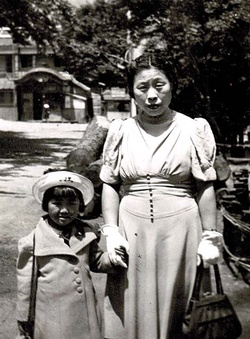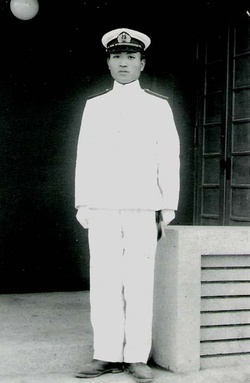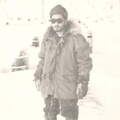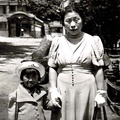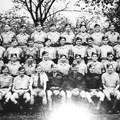Read Part 9 >>
No Peacetime for JCs: Go to Japan or east of the Rocky Mountains!
After the war, I heard my father discussing a letter that came from the government and written in Japanese by the JC head organizers dealing with the Canadian government’s push to either “Repatriate—Go ‘back home’ to Japan or move east of the Rockies out of B.C.” and they were “pushing and encouraging us,” coercing would be a better word, to go to Japan. My father said that those JCs must have got paid off by the government to even promote such a thing—he just couldn’t believe it! Probably they were brainwashed? As he found out later, many did sign up under pressure to “go back home” but also, many changed their minds not to go at the last minute. In my wife Susan’s family case, the government censored and prevented her brother, Kakuichiro-san’s letter through the Red Cross to reach them warning them not to come to Japan as they were experiencing extreme hardship and were in dire need of everything, even food. They found this out from her brother when they landed in Japan. They never did receive Kaku’s letter. I wonder why?
The JCs weren’t working for the government but at the larger internment camps there were leaders (I don’t remember where it was) who represented all the internees and dealt with the government and they in turn communicated with the smaller internment camps like Bridge River, I think mainly through newsletters. They were censored as well and they probably followed the government’s directions. A newspaper called The New Canadian was allowed by the government to be circulated but of course they had limitations as to what they could write, I heard.
At larger camps like Lemon Creek, the government had even set up Government Commission and Welfare Centers for various sneaky, hanky-panky reasons probably—who knows? Father resisted signing up for a while and moved us to Vernon and then to Lavington in the interim to work on farms and even tried farming on his own. For those that didn’t want to leave Canada, they had another sign-up sheet to go beyond the Rockies and that would “show your loyalty” to Canada by leaving B.C. Unbelievable! What kind of an idiotic statement is that by the B.C. government I thought, and it didn’t even make any sense. I guess the government tried just about everything possible to get us out of B.C.
Some die hard people remained in the interior of B.C. to “wait it out” to see if they can return to the place they were booted out from (but what for, since the government sold off all our properties and businesses in hopes of us not returning!). After the war the government used delay tactics even to discourage us from going back to the B.C. coast indicating that they are protecting us from the “deep resentment” of the coastal people against JCs and said that it will take time for them to “forgive us” (sic) in order to scare us.
The Vernon and Lavington years
Dad decided to hang around in the interior of B.C. before making any further big decisions. When we first moved to Vernon heating and cooking still required wood for burning and it was my responsibility to have slabs cut and piled for use throughout the year. Am I ever glad I had Amy to help me with my chores as I was a lazy kid.
Cutting the slabs with a bow saw by myself was very labour intensive and took ages so I always conned Amy into “playing sawmill” so that she can help me push and pull the large lumber jack’s large double handled heavy duty saw with me on the other end. Amy helped me load a number of slabs onto the cutting horse and I would then tell her that I’m the boss so get the axe and mark the slabs with cutting grooves by swinging the axe where I pointed to. Instead of using a stick pointer, I used my middle index finger and of course with my gloves on. It was working well but later I guess Amy got more efficient and I got slower in retrieving my hand. So, you guessed it, the axe went through my gloves and split my finger up to the bone! I was scared that my father might give me a blasting for “using” Amy so I patched it up myself and infection set in so it didn’t heal for over six months but I kept silent all that while.
I guess my problem was that I wasn’t as smart as Oji-chan Oue-san and didn’t do “Aizu” like him doing New Year’s mochitsuki in Bridge River! I found out then, why he was making all those funny musical sounds to keep everybody in step! It sure was a hard way to learn that lesson.
School Days with sisters Amy and Sumi
Sumi, Amy, and I were luckier as we were able to get back into the regular school system when we moved to Vernon after the war. As for my Mom, throughout the unsettled years, she was always positive and didn’t talk much at all about the war years in front of us. She did have an easy life during the Vancouver days but like everybody else who were interned, after the war when released they all had to restart their lives from scratch and Mom worked hard to keep the family going by working on farms later and also did sewing piece work at home when we finally settled down in Toronto.
Mom never talked to us about the war but when she got news after the war from her family that her younger brother, Ryozo was lost in action, she burst into tears as she read the letter to us. This was in Lavington, B.C.
Immediately, she called us over to perform “otsutome” service in front of the family butsudan. This continued every day for a week (memorial services later on the 49th day, 1st year, 3rd year, 5th year, 7th year, and the final 13th year). Each of those years was special and had a special meaning and she told us but I forgot now. My mother was very short, 4 feet 10 inches, but her brother, the baby of the family was 6 feet tall. He graduated from the Japanese Naval Academy at 22 and was put into service to fly reconnaissance seaplanes from battleships. When she showed us his graduation photo I felt sorry for her having additional worries about his well-being during the war.
From age 12 to 15 or so, we were living in a farming environment those days and even had summer jobs weeding, fruit picking, etc. at about 10 to 25 cents an hour! Fruit picking was best as we got paid by piecework. The locals were very nice to us and no discrimination because there weren’t very many JCs living in the interior of B.C. before we came along. Most of them didn’t even know that we were interned.
The Chibas were next door neighbours and their son, Junichi, was in the same grade from grade 7 on. We were on our bikes almost all day long wherever we went. We fished for trout along the creeks nearby and did a lot of hiking around the mountains. My stray pick-up cat came along too as soon as he saw me with a fishing rod and whenever I caught a trout, he would pounce on it when I brought the fish to shore. Once we found cougar tracks up in the hills so I ordered a .22 rifle from Eaton’s catalogue, bought bullets from the gun shop, and one day, Junichi and I went cougar hunting up in the mountains. We did see cougar tracks but all of a sudden we weren’t so bold anymore. We ran straight down the mountain non-stop until we got home and never brought up the subject of going hunting again. By the way, I didn’t even have a license to own a gun as I was underage.
I can’t recall where in Japan the Chibas came from but his dialect was “Zuzu-ben” and very hard to understand. Mom showed me this dialect and from then on I was able to understand him and even talk like him! There was a fellow about a mile away too—Kenji Anzai, and we hung around together a lot going to the community centre for various youth functions and that’s where we learned Square Dancing and good thing we learned as girls used to take us to the Sadie Hawkins dance at school every year. I guess at that stage, if boys had to ask the girls out, there wouldn’t have been any dance functions at all. We were all shy. We used to play a lot of hockey there too on an outside rink. We all pitched in to clear the surface and flooded the rink too. My father even allowed me to drive his car around nearby since I was 12 years old, alone! Those were the good old days, I’d say.
Late in 1948, Dad finally decided to move to Toronto for the children’s sake after recognizing that returning to Vancouver was a hopeless situation and the government’s deadline to make a forced decision was getting near. Mary wanted to become a hairdresser so Dad sent her to Toronto first to go to school and during her spare time look for a house. Probably the deadline was around the end of 1948 or early in 1949. This government deadline was for them to offer one-way “coach” train fare only but not for sleeping berths nor food. The train ride took five days and four nights. Only if you had signed up to be “repatriated” to Japan did the government pay a complete packaged deal to lure us to “go away,” a one-way ticket too. To make decisions where to go must have been very confusing and stressful for the Issei at that time.
© 2013 Frank Maikawa


